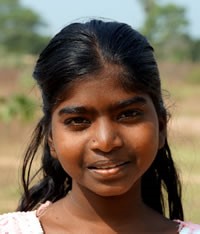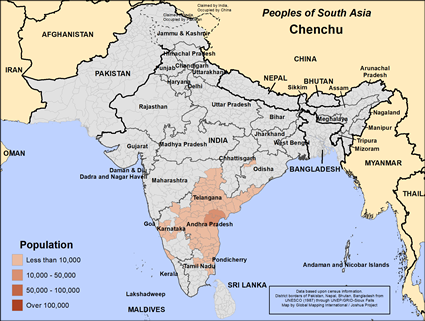Chenchu in India

Photo Source:
Copyrighted © 2026
Isudas All rights reserved. Used with permission |

Map Source:
People Group data: Omid. Map geography: UNESCO / GMI. Map Design: Joshua Project.
|
| People Name: | Chenchu |
| Country: | India |
| 10/40 Window: | Yes |
| Population: | 71,000 |
| World Population: | 71,000 |
| Primary Language: | Telugu |
| Primary Religion: | Hinduism |
| Christian Adherents: | 1.69 % |
| Evangelicals: | 0.00 % |
| Scripture: | Complete Bible |
| Ministry Resources: | Yes |
| Jesus Film: | Yes |
| Audio Recordings: | Yes |
| People Cluster: | South Asia Tribal - other |
| Affinity Bloc: | South Asian Peoples |
| Progress Level: |
|
Introduction / History
The Chenchu live in the hills of southern India, primarily in the state of Andhra Pradesh. The higher ranges of the Amrabad Plateau are dense forests and are almost exclusively inhabited by the Chenchu. Other Chenchu communities live in the states of Tamil Nadu, Karnataka and Odisha. Most speak Telugu, the language of their Hindu neighbors in Andhra Pradesh.
What Are Their Lives Like?
Life for the Chenchu revolves around the struggle to survive. Whenever food resources become scarce, they migrate to other places in search of new possibilities. A market economy and sophisticated machinery are totally absent from this group of hunters and gatherers. Likewise, concepts such as 'profit' or 'accumulation of wealth' are unknown to them. They prefer to remain segregated from other groups, living on the outskirts of multi-ethnic villages.
The Chenchu depend on the forest for nearly all of their food supply. They are hunters and gatherers, just as they have been for many generations. In former times, they hunted as a unified tribe. Today, they still hunt with spears or bows and arrows, but it is no longer a cooperative effort. Instead, each individual is responsible to provide for his own family, and their efforts are not very productive. The men are known as expert bamboo cutters and honey collectors. Very few crops are cultivated: tobacco, corn and millet. A few cows may be kept in a village for milk.
Many Chenchu have been forced out of their wandering, food-gathering lives by the growing number of small-time farmers. They now work as farmers or forest laborers and live in towns and well-settled villages. Their permanent villages have an average of seven houses and are occupied for only 10 to 15 years unless disease ravages the community and causes a massive number of deaths. They live in hive-shaped houses made of wattle thatch (poles intertwined with twigs, reeds, or branches). Temporary shelters, which take only three or four hours to build, are made of grass or leafy branches.
Chenchu society consists of clans (extended family units), local groups and families. They are exogamous, which means that they do not allow marriage within the same clan. They are also patrilineal, tracing the line of descent through the males. There are four main groups on the upper plateau, and villages usually have a mixture of various clans. The nuclear family (husband, wife, and unmarried children) is the basic unit of Chenchu society. One distinguishing factor of their tribe is the clear division of labor. The men hunt, gather honey, and make baskets, while the women prepare the food. The husband and wife are considered partners with equal rights; even their property is jointly owned.
Within the tribe, there are a number of differences between the older and younger generations. The older people remain rather scantily dressed, while the younger boys like to wear shirts and pants. Girls still wear the traditional sarees (colorful wrap-around dresses) or skirts and blouses, and some may wear more modern styles.
What Are Their Beliefs?
Due to increasing exposure to the plains peoples, the Chenchu have adopted the Hindu deities of the neighboring Telugu tribe. Today, they are virtually all Hindu, worshiping millions of gods and goddesses. Chenchus worship Bhagwan Taru who they believe lives in the sky and looks after Chenchus in all their doings. They also worship Garelamai Sama, the goddess of forest. They believe she protects them from any danger.
What Are Their Needs?
Alcoholism is a serious problem for many of the Chenchu. Their addictions allow them to temporarily escape from the reality of their difficult lives, but they need to find a permanent source of peace.
The Chenchu people need schools and medical facilities. Much of their homeland is being harmed by loggers and outsiders encroaching.
Prayer Points
Pray for the Lord to be the guardian and protector of the Chenchu people.
Ask the Lord to send dedicated laborers to start schools and hospitals for the Chenchu people.
Ask the Lord to save key leaders among the Chenchu who will boldly disciple others.
Pray for the Lord to give Chenchu people the spiritual hunger it takes to embrace Christ no matter what the cost.